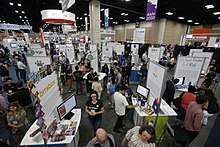International Society for Technology in Education
The International Society for Technology in Education (ISTE) is a nonprofit organization that serves educators interested in the use of technology in education. ISTE provides educational technology resources to support professional learning for educators and education leaders, including the ISTE Conference & Expo—an ed tech event, and the ISTE Standards for learning, teaching and leading with technology. ISTE also provides a suite of professional learning resources to members, including webinars, online courses, consulting services, books, and peer-reviewed journals and publications.
 | |
| Abbreviation | ISTE |
|---|---|
| Formation | 1979 |
| Founder | David Moursund and a group of K-12 and University of Oregon educators |
| Type | 501(c)(3) non-profit |
| Purpose | Education, Membership organization |
| Headquarters | Washington, DC, United States |
Area served | Worldwide |
Key people | Bill Bass, president Richard Culatta, CEO |
Staff | 51 |
| Website | iste |
Formerly called | International Council for Computers in Education |
Conferences & Expo

ISTE is known for hosting a variety of events related to innovation in elementary, secondary, and higher education. The annual conference (called the ISTE Conference & Expo) serves as a forum for exploring and exchanging ideas about education technology with educators from around the world. The event attracts more than 24,000 educators and education leaders. Recent conferences have been held in Chicago, IL (2018), San Antonio, TX (2017), Denver, CO (2016) Philadelphia, PA (2015) and Atlanta, GA (2014).
Other ISTE Events
ISTE events include the No Fear Coding Lab held in Detroit in October 2018; the Creative Constructor Lab held in Seattle in November 2018; and the Digital Leadership Summit held in Santa Clara, California, in January 2019.
Educational Technology Standards
The ISTE Standards (formerly "National Educational Technology Standards", NETS) are a framework for implementing digital strategies in education to positively impact learning, teaching and leading. Along with the standards themselves, ISTE offers information and resources to support understanding and implementation of the standards at a variety of levels.
ISTE Journalism
In November 2019, ISTE announced the acquisition of EdSurge in a pairing of events and news-focused education technology organizations. Terms of the deal were not disclosed, but CEO Richard Culatta stated that its investors will not receive a return on their investment.[1]
ISTE Books and Journals
ISTE also publishes books focused on technology in education, with titles on topics such as coding, artificial intelligence, project-based learning, and augmented and virtual realities. In addition ISTE publishes two peer-reviewed journals: 1) the Journal of Research on Technology in Education (JRTE), and the 2) Journal of Digital Learning in Teacher Education (JDLTE). Both JRTE and JDLTE are currently published by Taylor & Francis. In 2018, JRTE published its 50th volume. JRTE is published quarterly with an acceptance rate at approximately 17%.
Professional Learning
ISTE provides teacher professional development and resources on educational technology topics, including digital citizenship, STEM, computer science/computational thinking, artificial intelligence, and global collaboration. The organization offers professional learning for a wide variety of educator roles, including ed tech coaches, library media specialists, and classroom educators and specialists.
The ISTE Certification for Educators credential is a competency-based, vendor-neutral teacher certification based on the ISTE Standards for Educators. It recognizes educators who use ed tech for learning effectively. The process to obtain this credential has three parts: a two-day, in-person training workshop, a five- to eight-week online course (led by a professional development facilitator and with a cohort), and a final submission of a portfolio of artifacts to ISTE for review and evaluation. The certification program is delivered through ISTE-selected Certification Authorized Providers across the world.
Grant Work
ISTE collaborates with education organizations in several ways, including grants. ISTE’s grant work includes developing professional learning programs that incorporate educational technology best practices across various topics. Current ISTE grant programs include a learning science initiative (2018–2019) funded by the Chan Zuckerberg Foundation, an artificial intelligence explorations program (2018–2019) funded by GM, an educational technology initiative focused on retail and workforce development funded by Walmart, a 2018 open education resources initiative funded by Hewlett Foundation, and a collaboration on future-ready librarianship funded by Follet.
Membership
ISTE membership is extended to individuals, affiliates (organizations, like school districts and state technology organizations), and corporate members interested in the use and application of technology in Education.
Corporate Members
In addition to an individual membership of over 20,000, ISTE has several corporate members.
History
The International Council for Computers in Education (ICCE) was founded in 1979, with David Moursund as executive officer and editor-in-chief of the organization's organ The Computing Teacher.[2] In 1989 ICCE changed its name to the present name, International Society for Technology in Education (ISTE). Shortly after, in 1990, The Computing Teacher was retitled Learning and Leading with Technology.[3]
References
- News, I. B. L. "ISTE Conference Organizer Absorbs EdSurge Media – Investors Won't Be Rewarded | IBL News". Retrieved 2019-12-09.
- Bob Johnstone (2003). Never Mind the Laptops: Kids, Computers, and the Transformation of Learning. iUniverse. pp. 119–. ISBN 978-0-595-28842-7.
- Today's Education: The Journal of the National Education Association. Annual edition. The Association. 1983.